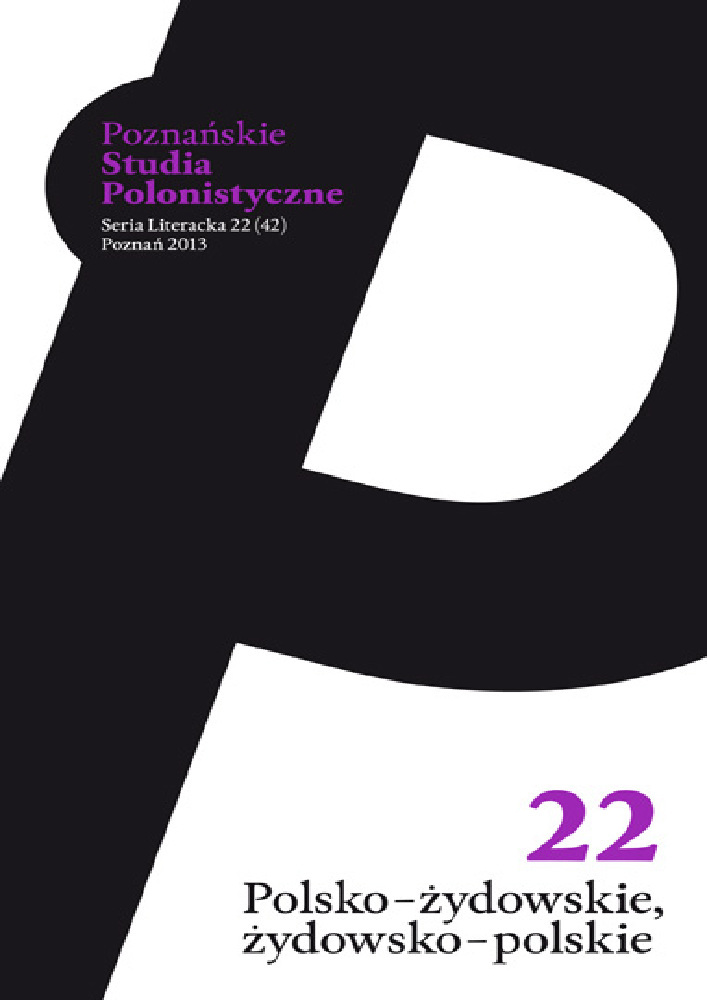Abstrakt
Based on conversations with the hero, Patrycja Bukalska’s Rysiek z Kedywu. Niezwykłe losy Stanisława Aronsona [Rysiek from Kedyw. Incredible Tribulations of Stanisław Aronson], is an important contribution to the study of Polish-Jewish relations. This is because Aronson’s life is a unique combination of various elements of Polish and Jewish biographies in the 20th century. His life story includes: a happy childhood in a wealthy assimilated Jewish family, the nightmare of Soviet and German occupation, deaths of closest relations, participation in Armia Krajowa resistance movement and Warsaw Uprising, military service in general Anders’s corps, and then in Israeli army. Jew, Pole, Israeli: each of these identies demanded a different ordering and expression of memory, different omissions and declarations. With such an unusual and mixed experience, Aronson had a vantage point to look at the images that Poles, Jews, Holocaust survivors and citizens of newly created Israel, had of one another. Bukalska’s book can be read as a voice against generalizations, as a narrative about a concrete human life immersed in history, a narrative about individual choices, courage, and friendship.
Bibliografia
Bukalska P., Ostatnia wojna Stanisława Aronsona, „Tygodnik Powszechny” 2004, nr 45.
Bukalska P., Rysiek z Kedywu. Niezwykłe losy Stanisława Aronsona, Kraków 2009.
Roquefeuil B. de, Uciekinier, przeł. T. Matkowski, Łomianki 2012.
Zychowicz P., Żyd z Armii Krajowej. Rozmowa ze Stanisławem Aronsonem, „Rzeczpospolita” 2009, nr 136.
Licencja
Autorzy
Autorzy tekstów przyjętych do publikacji w czasopiśmie „Poznańskie Studia Polonistyczne. Seria Literacka” są zobowiązani do wypełnienia, podpisania i odesłania na adres redakcji umowy o udzielenie nieodpłatnej licencji do utworów, z zobowiązaniem do udzielania sublicencji CC.
Zgodnie z umową, autorzy tekstów opublikowanych w czasopiśmie „Poznańskie Studia Polonistyczne. Seria Literacka” udzielają Uniwersytetowi im. Adama Mickiewicza w Poznaniu niewyłącznej i nieodpłatnej licencji oraz zezwalają na użycie sublicencji Creative Commons Attribution-NoDerivatives 4.0 International (CC BY-ND 4.0).
Autorzy zachowują prawa do dalszego, swobodnego rozporządzania utworem.
Użytkownicy
Zainteresowani użytkownicy internetu uprawnieni są do korzystania z utworów opublikowanych od 2016 roku w „Poznańskich Studiach Polonistycznych. Serii Literackiej” pod następującymi warunkami:
- uznanie autorstwa – obowiązek podania wraz z rozpowszechnionym utworem, informacji, o autorstwie, tytule, źródle (odnośniki do oryginalnego utworu, DOI) oraz samej licencji;
- bez tworzenia utworów zależnych – utwór musi być zachowany w oryginalnej postaci, nie można bez zgody twórcy rozpowszechniać np. tłumaczeń, opracowań.
Do wszystkich tekstów opublikowanych przed 2016 r. prawa autorskie są zastrzeżone.
Inne
Uniwersytet im. Adama Mickiewicza w Poznaniu zachowuje prawo do czasopisma jako całości (układ, forma graficzna, tytuł, projekt okładki, logo itp.).
